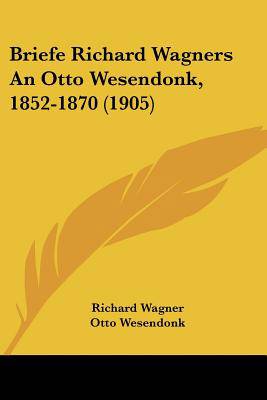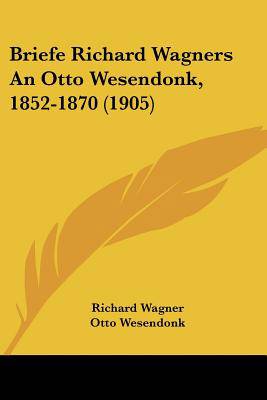
Door een staking bij bpost kan je online bestelling op dit moment iets langer onderweg zijn dan voorzien. Dringend iets nodig? Onze winkels ontvangen jou met open armen!
- Afhalen na 1 uur in een winkel met voorraad
- Gratis thuislevering in België vanaf € 30
- Ruim aanbod met 7 miljoen producten
Door een staking bij bpost kan je online bestelling op dit moment iets langer onderweg zijn dan voorzien. Dringend iets nodig? Onze winkels ontvangen jou met open armen!
- Afhalen na 1 uur in een winkel met voorraad
- Gratis thuislevering in België vanaf € 30
- Ruim aanbod met 7 miljoen producten
Zoeken
Briefe Richard Wagners An Otto Wesendonk, 1852-1870 (1905)
Richard Wagner, Otto Wesendonk, Wolfgang Golther
Paperback | Engels
€ 32,45
+ 64 punten
Uitvoering
Omschrijving
Briefe Richard Wagners An Otto Wesendonk, 1852-1870 (1905) is a collection of letters written by the renowned composer Richard Wagner to his friend and patron Otto Wesendonk between the years 1852 and 1870. The letters offer a fascinating glimpse into the personal and professional life of Wagner during this period, as he worked on some of his most famous operas, including Tristan und Isolde and Die Walk�����re.The letters cover a wide range of topics, from Wagner's creative process and artistic philosophy to his personal relationships and financial struggles. They also provide insight into the complex and often controversial figure of Wagner himself, as he grappled with issues of nationalism, anti-Semitism, and his own place in the world of music.Despite the sometimes challenging subject matter, the letters are written in a lively and engaging style, with Wagner's wit and humor shining through even in the most serious discussions. They offer a unique perspective on one of the greatest composers of all time, and are a must-read for anyone interested in the history of music and culture in the 19th century.This scarce antiquarian book is a facsimile reprint of the old original and may contain some imperfections such as library marks and notations. Because we believe this work is culturally important, we have made it available as part of our commitment for protecting, preserving, and promoting the world's literature in affordable, high quality, modern editions, that are true to their original work.
Specificaties
Betrokkenen
- Auteur(s):
- Uitgeverij:
Inhoud
- Aantal bladzijden:
- 160
- Taal:
- Engels
Eigenschappen
- Productcode (EAN):
- 9781120167217
- Verschijningsdatum:
- 24/09/2009
- Uitvoering:
- Paperback
- Formaat:
- Trade paperback (VS)
- Afmetingen:
- 152 mm x 229 mm
- Gewicht:
- 222 g

Alleen bij Standaard Boekhandel
+ 64 punten op je klantenkaart van Standaard Boekhandel
Beoordelingen
We publiceren alleen reviews die voldoen aan de voorwaarden voor reviews. Bekijk onze voorwaarden voor reviews.











